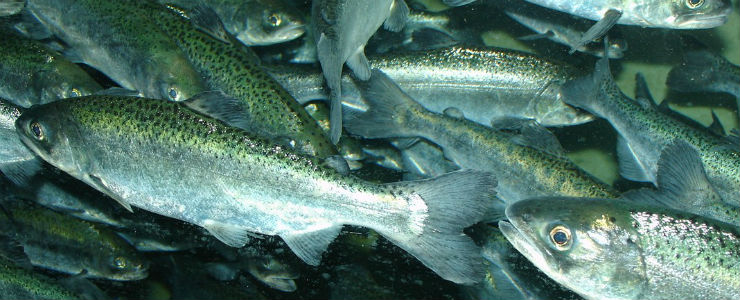Fisheries and Fishery Management
Scientists in the Fisheries and Fishery Management cluster have diverse interests, ranging from life histories of individual species, roles of ecological and physiological processes on population dynamics, population genetics, and fishery stock assessments. Members of this group have also been heavily involved in the establishment and monitoring of Marine Protected Areas in California’s coastal waters, and how fishery regulations affect both the fish populations and the fishing communities who are dependent on the sustainability of individual fisheries for economic survival.
In 2000, the NOAA Fisheries, Southwest Fisheries Science Center Fisheries Ecology Division was built on the Coastal Science Campus. This Center now has over 100 scientists and support staff (including many Institute of Marine Science collaborators) who conduct research relevant to the conservation and management of West Coast groundfish resources, the restoration and recovery of threatened and endangered fishes (salmon, steelhead trout and sturgeon) in California. Many of the NOAA scientists hold research associate appointments within the Institute, some hold adjunction appointments within academic departments, and many take an active role in supporting, advising and mentoring UCSC graduate students.
Faculty (Professors and Adjuncts) and Professional Researchers affiliated with the Fisheries and Fishery Management Cluster Group:
Suzanne Alonzo, Professor of Ecology & Evolutionary Biology: Sexual selection, social behavior and the evolution and ecology of reproduction.
Giacomo Bernardi, Professor of Ecology & Evolutionary Biology: Fish biology, phylogenetics, evolution.
Mark Carr, Professor of Ecology & Evolutionary Biology: Marine ecology, applied marine ecology.
Eric Danner, Associate Researcher: Spatial patterns in ecology using coupled physical and biological models to understand how climate and water management interact to impact the diverse range of aquatic habitats in California’s Central Valley watershed.
John Field, Researcher: Understanding the spatial scales of recruitment processes, investigating the mechanisms that drive recruitment variability and the spatial distribution of forage species, ecosystem interactions between variable forage abundance and higher trophic level predators, improved methods for stock assessments, the reproductive ecology of groundfish, and the role of climate variability and climate change in all of these respective processes.
John Carlos Garza, Adjunct Professor of Ocean Sciences: Population and ecological genetics of marine organisms.
Elliott Hazen, Adjunct Professor of Ecology & Evolutionary Biology: Marine ecology, birds and mammals, conservation biology: focusing on predator-prey dynamics and their response to environmental variability and global change.
Joe Kiernan, Assistant Researcher: How resource subsidies, environmental stochasticity, and biotic interactions affect the structure and function of riverine communities; particularly the relative and synergistic roles of physical habitat, hydrology, and food web structure in determining the growth and production of juvenile salmonids, and how these factors vary across both time and space.
Steven Lindley, Researcher: Physical environment influences the dynamics of aquatic populations and communities, particularly involving Chinook salmon, steelhead and green sturgeon, in systems ranging from small coastal watersheds to the northeast Pacific.
Marc Mangel, Professor Emeritus SOE: Mathematical modeling of biological phenomena, especially quantitative issues in fishery management; mathematical and computational aspects of aging and disease; impact of technology on biological systems.
Nathan Mantua, Researcher: Climate variability, change, and predictability, climate impacts on aquatic ecosystems, and the use of climate information in resource management.
Eric Palkovacs, Professor of Ecology & Evolutionary Biology, FCP Director: Freshwater ecology, eco-evolutionary dynamics, fisheries and fish ecology.
Carrie Pomeroy, Researcher, Adjunct Professor of Coastal Science & Policy Program: Human dimensions of fisheries and fishing communities, and how environmental, regulatory, social and economic factors affect their function and well-being.
Peter Raimondi, Professor of Ecology & Evolutionary Biology, Interim Director of the Institute of Marine Sciences: Marine ecology, evolutionary ecology, experimental design, applied ecology.
Katherine Seto, Assistant Professor, Environmental Studies Department: Marine and coastal law and policy, political ecology, marine resource governance
Brian Spence, Researcher: The interactions between anadromous salmonids and their environments across a broad range of spatial and temporal scales.
Brian Wells, Researcher: The effect of environmental variability and fishing practices on population dynamics of seabirds, krill, and fishes.
Juan Zwolinski, Associate Researcher: Automation of data processing of satellite-sensed oceanographic conditions and acoustic-trawl surveys for routinely predicting and surveying potential sardine habitat and rapidly estimating the abundances and distributions of coastal pelagic species and krill.

